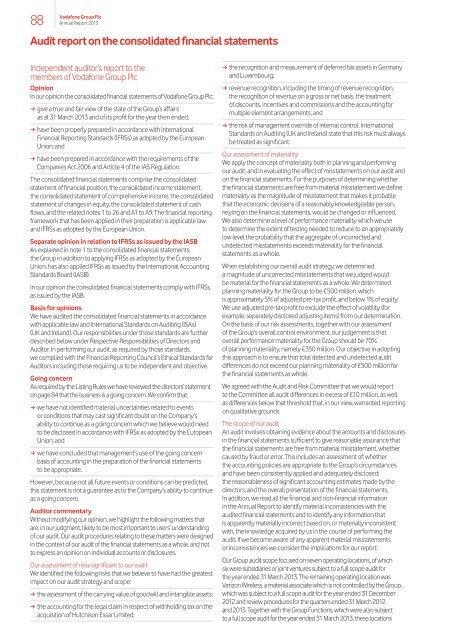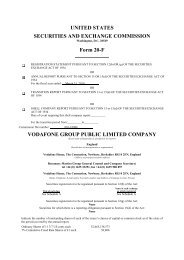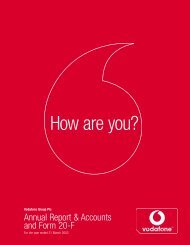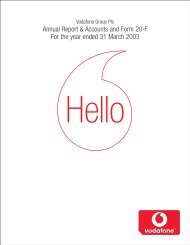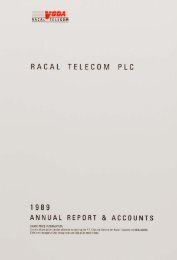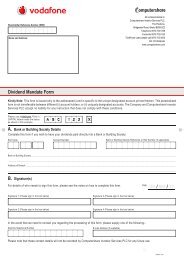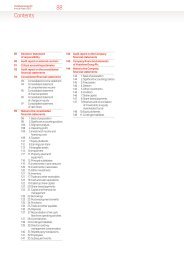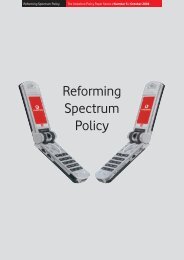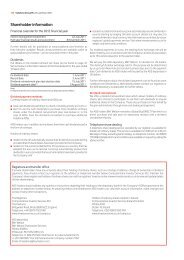The way ahead? - Vodafone
The way ahead? - Vodafone
The way ahead? - Vodafone
Create successful ePaper yourself
Turn your PDF publications into a flip-book with our unique Google optimized e-Paper software.
88<br />
<strong>Vodafone</strong> Group Plc<br />
Annual Report 2013<br />
Audit report on the consolidated financial statements<br />
Independent auditor’s report to the<br />
members of <strong>Vodafone</strong> Group Plc<br />
Opinion<br />
In our opinion the consolidated financial statements of <strong>Vodafone</strong> Group Plc:<br />
a give a true and fair view of the state of the Group’s affairs<br />
as at 31 March 2013 and of its profit for the year then ended;<br />
a have been properly prepared in accordance with International<br />
Financial Reporting Standards (IFRSs) as adopted by the European<br />
Union; and<br />
a have been prepared in accordance with the requirements of the<br />
Companies Act 2006 and Article 4 of the IAS Regulation.<br />
<strong>The</strong> consolidated financial statements comprise the consolidated<br />
statement of financial position, the consolidated income statement,<br />
the consolidated statement of comprehensive income, the consolidated<br />
statement of changes in equity, the consolidated statement of cash<br />
flows, and the related notes 1 to 26 and A1 to A9. <strong>The</strong> financial reporting<br />
framework that has been applied in their preparation is applicable law<br />
and IFRSs as adopted by the European Union.<br />
Separate opinion in relation to IFRSs as issued by the IASB<br />
As explained in note 1 to the consolidated financial statements,<br />
the Group in addition to applying IFRSs as adopted by the European<br />
Union, has also applied IFRSs as issued by the International Accounting<br />
Standards Board (IASB).<br />
In our opinion the consolidated financial statements comply with IFRSs<br />
as issued by the IASB.<br />
Basis for opinions<br />
We have audited the consolidated financial statements in accordance<br />
with applicable law and International Standards on Auditing (ISAs)<br />
(UK and Ireland). Our responsibilities under those standards are further<br />
described below under Respective Responsibilities of Directors and<br />
Auditor. In performing our audit, as required by those standards,<br />
we complied with the Financial Reporting Council’s Ethical Standards for<br />
Auditors including those requiring us to be independent and objective.<br />
Going concern<br />
As required by the Listing Rules we have reviewed the directors’ statement<br />
on page 84 that the business is a going concern. We confirm that:<br />
a we have not identified material uncertainties related to events<br />
or conditions that may cast significant doubt on the Company’s<br />
ability to continue as a going concern which we believe would need<br />
to be disclosed in accordance with IFRSs as adopted by the European<br />
Union; and<br />
a we have concluded that management’s use of the going concern<br />
basis of accounting in the preparation of the financial statements<br />
to be appropriate.<br />
However, because not all future events or conditions can be predicted,<br />
this statement is not a guarantee as to the Company’s ability to continue<br />
as a going concern.<br />
Auditor commentary<br />
Without modifying our opinion, we highlight the following matters that<br />
are, in our judgment, likely to be most important to users’ understanding<br />
of our audit. Our audit procedures relating to these matters were designed<br />
in the context of our audit of the financial statements as a whole, and not<br />
to express an opinion on individual accounts or disclosures.<br />
Our assessment of risks significant to our audit<br />
We identified the following risks that we believe to have had the greatest<br />
impact on our audit strategy and scope:<br />
a the assessment of the carrying value of goodwill and intangible assets;<br />
a the accounting for the legal claim in respect of withholding tax on the<br />
acquisition of Hutchison Essar Limited;<br />
a the recognition and measurement of deferred tax assets in Germany<br />
and Luxembourg;<br />
a revenue recognition, including the timing of revenue recognition,<br />
the recognition of revenue on a gross or net basis, the treatment<br />
of discounts, incentives and commissions and the accounting for<br />
multiple element arrangements; and<br />
a the risk of management override of internal control. International<br />
Standards on Auditing (UK and Ireland) state that this risk must al<strong>way</strong>s<br />
be treated as significant.<br />
Our assessment of materiality<br />
We apply the concept of materiality both in planning and performing<br />
our audit, and in evaluating the effect of misstatements on our audit and<br />
on the financial statements. For the purposes of determining whether<br />
the financial statements are free from material misstatement we define<br />
materiality as the magnitude of misstatement that makes it probable<br />
that the economic decisions of a reasonably knowledgeable person,<br />
relying on the financial statements, would be changed or influenced.<br />
We also determine a level of performance materiality which we use<br />
to determine the extent of testing needed to reduce to an appropriately<br />
low level the probability that the aggregate of uncorrected and<br />
undetected misstatements exceeds materiality for the financial<br />
statements as a whole.<br />
When establishing our overall audit strategy, we determined<br />
a magnitude of uncorrected misstatements that we judged would<br />
be material for the financial statements as a whole. We determined<br />
planning materiality for the Group to be £500 million, which<br />
is approximately 5% of adjusted pre-tax profit, and below 1% of equity.<br />
We use adjusted pre-tax profit to exclude the effect of volatility (for<br />
example, separately disclosed adjusting items) from our determination.<br />
On the basis of our risk assessments, together with our assessment<br />
of the Group’s overall control environment, our judgement is that<br />
overall performance materiality for the Group should be 70%<br />
of planning materiality, namely £350 million. Our objective in adopting<br />
this approach is to ensure that total detected and undetected audit<br />
differences do not exceed our planning materiality of £500 million for<br />
the financial statements as whole.<br />
We agreed with the Audit and Risk Committee that we would report<br />
to the Committee all audit differences in excess of £10 million, as well<br />
as differences below that threshold that, in our view, warranted reporting<br />
on qualitative grounds.<br />
<strong>The</strong> scope of our audit<br />
An audit involves obtaining evidence about the amounts and disclosures<br />
in the financial statements sufficient to give reasonable assurance that<br />
the financial statements are free from material misstatement, whether<br />
caused by fraud or error. This includes an assessment of: whether<br />
the accounting policies are appropriate to the Group’s circumstances<br />
and have been consistently applied and adequately disclosed;<br />
the reasonableness of significant accounting estimates made by the<br />
directors; and the overall presentation of the financial statements.<br />
In addition, we read all the financial and non-financial information<br />
in the Annual Report to identify material inconsistencies with the<br />
audited financial statements and to identify any information that<br />
is apparently materially incorrect based on, or materially inconsistent<br />
with, the knowledge acquired by us in the course of performing the<br />
audit. If we become aware of any apparent material misstatements<br />
or inconsistencies we consider the implications for our report.<br />
Our Group audit scope focused on seven operating locations, of which<br />
six were subsidiaries or joint ventures subject to a full scope audit for<br />
the year ended 31 March 2013. <strong>The</strong> remaining operating location was<br />
Verizon Wireless, a material associate which is not controlled by the Group,<br />
which was subject to a full scope audit for the year ended 31 December<br />
2012 and review procedures for the quarters ended 31 March 2012<br />
and 2013. Together with the Group Functions, which were also subject<br />
to a full scope audit for the year ended 31 March 2013, these locations


